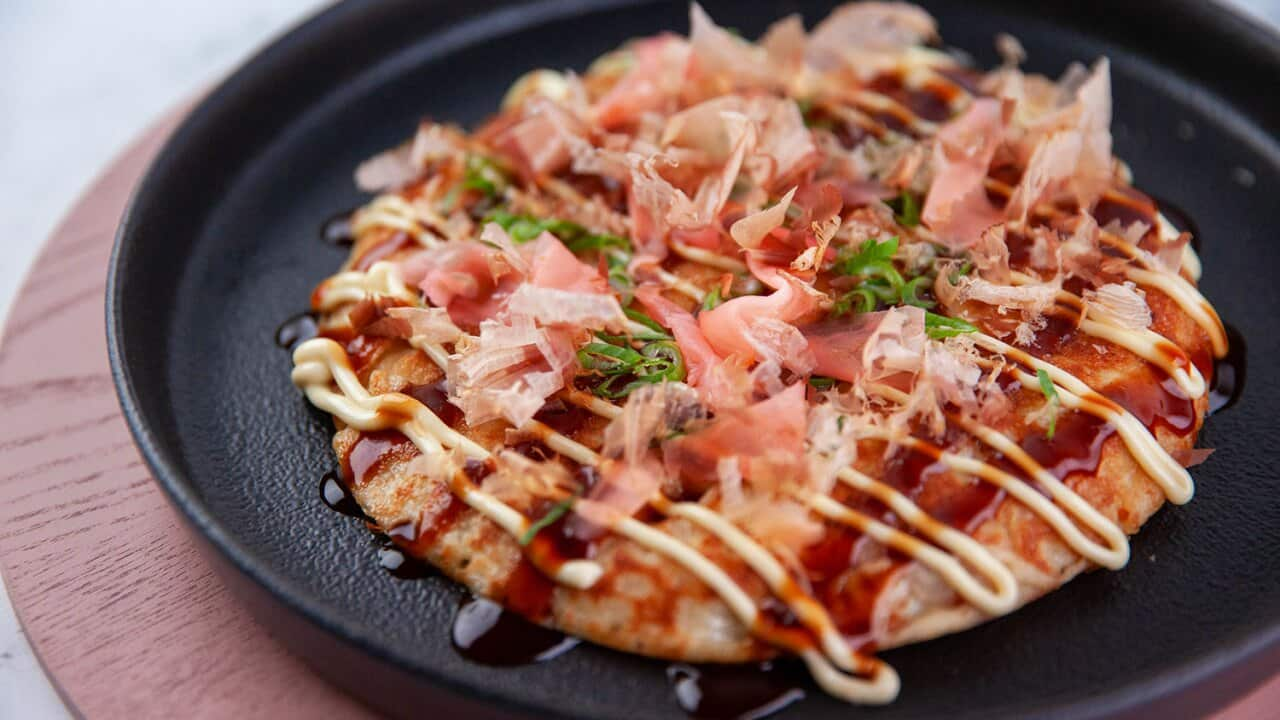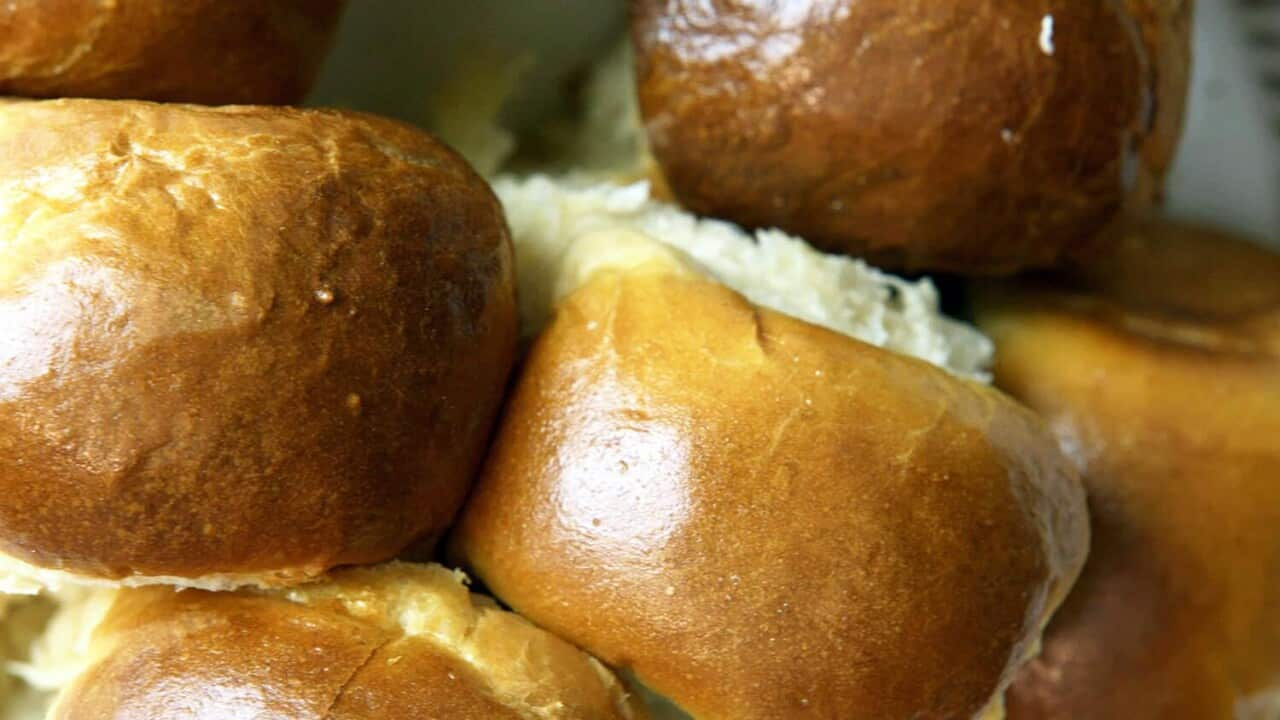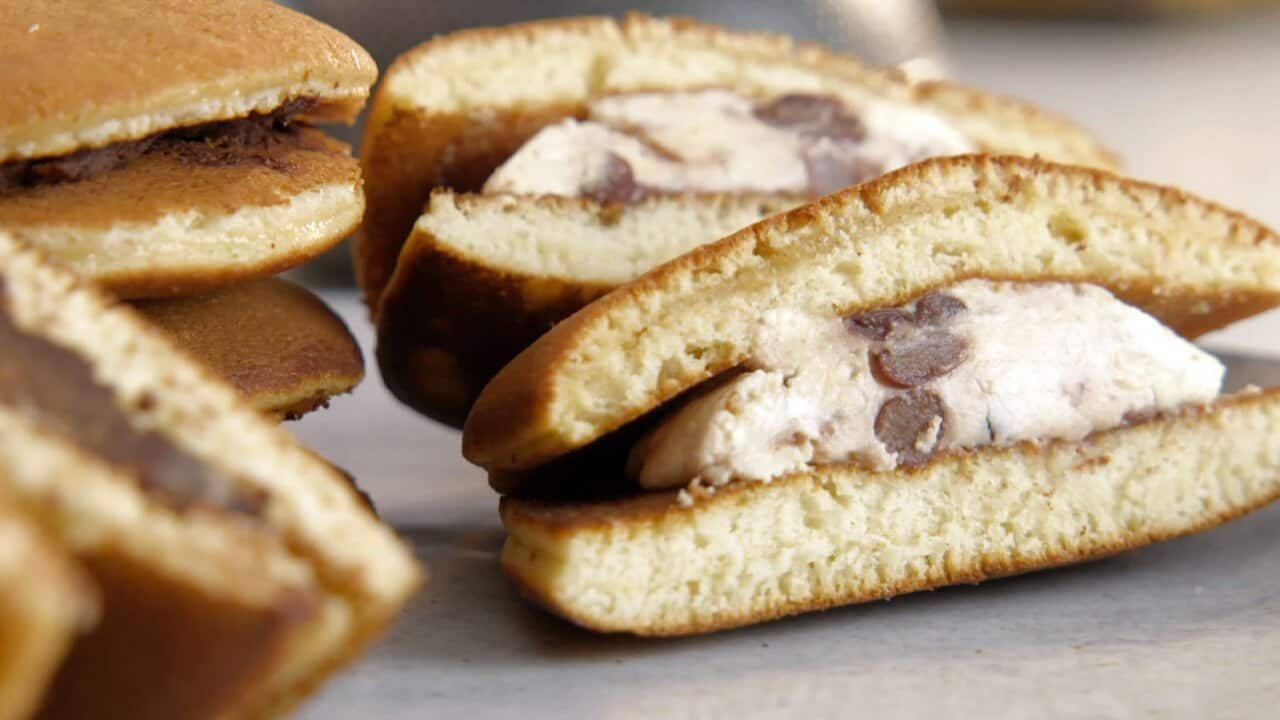As general manager of Melbourne's Tsujiri tea house, he'd know what the top-tier stuff is like. On a work trip to Japan, he tasted the most premium version of powdered green tea you could imagine.
"It is very smooth, but it's a different level," he says. "It's like when you're having wine, there's cheap and expensive wine."
While most matcha is picked and sorted by machines, the pricey versions are processed by a person individually inspecting each leaf to see if it's fresh enough, young enough, and in prime condition to be turned into a high-grade tea.
Of course, at Tsujiri, the average customer isn't sipping $1,000-per-kilo tea, but Iswadi appreciates that there's a place for the most luxurious style of matcha.
"It's like a handbag, there are a lot of brands. Which one do you want, what do you want to choose?" he says. There's the sensibly priced version you can sling over your shoulder every day, without a care, while others might splurge on a designer showstopper that they'll intensely guard and only bring out on the most special of occasions. Matcha is similar. Melbourne's Tsujiri focuses on quality tea, but its takeaway focus means prices are accessible and nowhere near the $1,000 zone. The matcha-flavoured desserts range from the best-selling mille crepes (decked with 20 pancake layers or more) to parfaits stacked high with ice-cream, red bean and shiratama (mini rice balls). The drinks are, of course, heavily dosed with tea, from the matcha brûlée latte to the yuzu sencha.
Melbourne's Tsujiri focuses on quality tea, but its takeaway focus means prices are accessible and nowhere near the $1,000 zone. The matcha-flavoured desserts range from the best-selling mille crepes (decked with 20 pancake layers or more) to parfaits stacked high with ice-cream, red bean and shiratama (mini rice balls). The drinks are, of course, heavily dosed with tea, from the matcha brûlée latte to the yuzu sencha.

Tsujiri's Melbourne outpost might only be three years old, but the brand originates from Japan and has a rich history. Source: Supplied
For anyone wanting to brew their own loose leaf at home, Tsujiri sells various green-tea varieties (from grassy sencha to roasted, nutty hojicha) for your teapot.
Tsujiri's Melbourne outpost might only be three years old, but the brand originates from Japan and has a rich history. It was founded , when he bought a 12-hectare tea plantation in Uji, Kyoto .
Yes, it's staggering to think that a teenager would have enough to money to afford such a big land purchase, but Tsuji started his career at age nine (!) as a merchant's apprentice – so he had been saving for half his life by that point. Tsuji (who also went by the names Sensuke and Rihei at various stages) became such an important figure in the tea-growing region that there's a statue of him near the main gate of , the town's famous heritage-listed landmark. (The site is so significant, it appears on Japan's 10-yen coin.)
Tsuji (who also went by the names Sensuke and Rihei at various stages) became such an important figure in the tea-growing region that there's a statue of him near the main gate of , the town's famous heritage-listed landmark. (The site is so significant, it appears on Japan's 10-yen coin.)

Melbourne's Tsujiri focuses on quality tea, but its quick-service, takeaway focus means that prices are accessible. Source: Supplied
He by the emperor for his development of tea and for inventing the chabitsu container, which meant tea could be stored in premium condition and transported to other cities. Melbourne's Tsujiri shop pays tribute to this history by incorporating the tea box into its décor.
At the Melbourne outpost, matcha is (unsurprisingly) a big deal and Iswadi is a pro at detecting the best kind.
"When you drink it, there's a bitterness and there's a sweet aftertaste. You can smell the fresh leaf," he says. It shouldn't taste gritty like unpleasant medicine; instead, well-made matcha should have a complexity, brightness and depth.
The powdered tea features heavily on Tsujiri's menu, from the ceremonial-grade matcha to the swirls of cold matcha soba noodles served with soy sauce and shredded nori seaweed.
The manager says different matcha strengths and types are used: the ceremonial-grade tea features the purest kind, whereas that isn't necessary for a milky latte, where the subtleties and clarity would get lost. For the kakigori (shaved ice) desserts, "the taste is different because we put different matcha in that as well," he says. "For our menu here, every product has a different taste, even if it's matcha.
The desserts at Tsujiri are a showcase of Japan's unique flavours: the "Uji sunset" kakigori, for instance, has a dark topping of "kuromitsu, which is Japanese brown sugar syrup," explains Iswadi, while the Melbourne parfait is layered with (jelly-like treats in roasted kinako soybean powder). (Okinawan sweet potato) oozes from a lava cake and adds a starchy, purple hit to a multi-coloured matcha latte. , which dates back to the , is a dessert that Japanese people typically savour during the warmer months.
At Melbourne's Tsujiri, it's served with warabi mochi, red bean shiratama, three kinds of jelly (matcha, kuromitsu and plain), ice-cream and a rich kuromitsu topping.
Some items have Australian touches (like the corn flakes in the chiffon cake parfait or the "Mount Fuji" taro dessert that's a Melbourne-only special). Iswadi admits that certain things had to be tweaked for some local palates.
"When we first opened, a lot of people complained: 'I don't like red bean'," he says. So Tsujiri will suggest, say, ordering ice-cream with custom toppings, rather than a parfait where the red bean is a key part. Some dishes, of course, require an appreciation of Japanese desserts: how they're built on the balance of flavours and designed for your spoon to scoop through layers of different ingredients.
Some people might dismiss the shiratama rice balls as being "tasteless", says Iswadi, but that's not the point. "The idea of the shiratama is you get the texture, the chewiness of the shiratama. You eat it with the ice-cream." The sweetness of kuromitsu, the texture of red bean, the contrast of other ingredients: they all play a role in a multi-layered Japanese dessert.
If you're unable to get to Melbourne to sip on Tsujiri lattes or scoop through its parfaits, there's a chance you can at least get a caffeine hit from its tea products. The brand plans to sell its sencha, genmaicha and other loose-leaf brews online later this summer.
Melbourne might not be its last outpost in Australia, either.
"Hopefully in the future, we can open in Sydney," adds Iswadi.
146 Swanston Street, Melbourne
Sun – Weds 11 am – 10 pm | Thurs – Sat 11 am – 10.30 pm
JAPANESE FOOD TRADITIONS

This Sydney eatery serves a special kind of ramen











